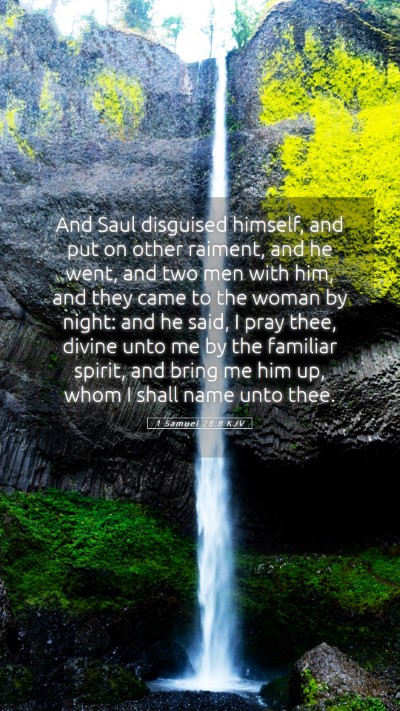Bible Verse Commentary: 1 Samuel 28:8
Verse: 1 Samuel 28:8 - "So Saul disguised himself and put on other garments and went, and two men with him; and they came to the woman by night. And he said, 'Consult a spirit for me, and bring up for me the one I shall name to you.'"
This passage depicts a critical moment in the life of King Saul, illustrating his desperation and the moral ambiguity of his choices. The act of disguising himself indicates Saul's fear and the lengths to which he would go to seek guidance, showing both a rejection of God’s covenant and a deep personal crisis.
Meaning and Interpretation
-
Historical Context:
This event occurs at a time when Saul is facing significant adversity, particularly from the Philistines, and has already been rejected by God. His decision to consult a medium is in stark contrast to God's commandments, highlighting the gravity of his situation.
-
Spiritual Implications:
Saul's actions underscore a fundamental Biblical theme: the dangers of seeking guidance outside of faith in God. Albert Barnes notes that this reflects a departure from divine authority and an embrace of occult practices, which were strictly forbidden according to Mosaic Law (Leviticus 19:31).
-
Character Analysis:
Matthew Henry observes Saul’s transformation from a once God-fearing leader to a desperate, compromised figure. This illustrates the destructive nature of sin and the moral decline that can occur when one turns away from God and seeks answers in dubious places.
-
Application for Today:
This verse speaks to modern readers about the importance of reliance on God's wisdom rather than resorting to secular or forbidden sources. It serves as a cautionary tale about the consequences of losing faith and seeking guidance through unholy means.
Cross References
- Leviticus 19:31: Prohibition against turning to mediums.
- 1 Chronicles 10:13-14: Decline of Saul's reign and his turning from God.
- 1 Samuel 15:26: God rejecting Saul as king.
Insights from Public Domain Commentaries
Matthew Henry: Henry emphasizes the dire consequences of Saul's unfaithfulness. He notes that the act of consulting the medium reflects a loss of trust in God's guidance, which Saul had previously received. This choice illustrates how fear and desperation can lead individuals to abandon their principles.
Albert Barnes: Barnes highlights the deeper spiritual implications. Saul’s consultation with a medium not only signifies his alienation from God, but it also reveals his spiritual confusion and the weight of his internal conflicts. Barnes advocates for understanding this passage within the broader narrative of Saul's tragic downfall.
Adam Clarke: Clarke points out the averse consequences of seeking wisdom from the occult. He provides a detailed critique of Saul's dependence on such practices, concluding that true spiritual insight and guidance can only be attained through devotion to God, not through ungodly means.
Understanding Scripture Today
This verse invites reflection on how individuals discern wisdom and guidance in their lives. In a world filled with distractions and alternatives to spiritual truth, 1 Samuel 28:8 serves as a reminder to seek understanding from God rather than through deceptive or sinful means.
In-depth Bible verse analysis can unlock deeper insights into both the text and the historical context surrounding it, aiding in personal study and group discussions.


